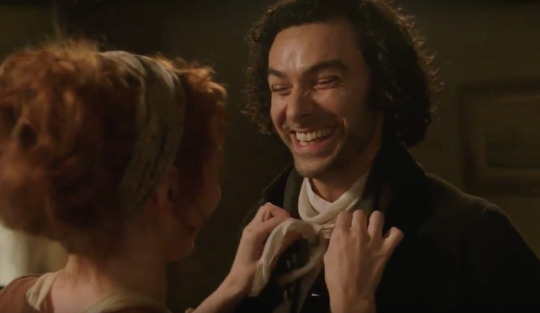Text
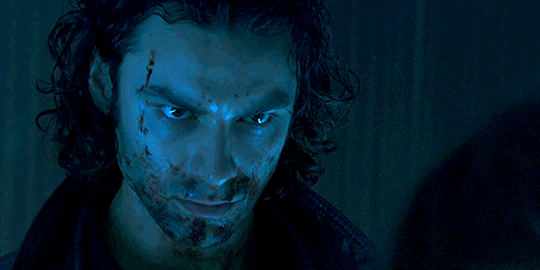
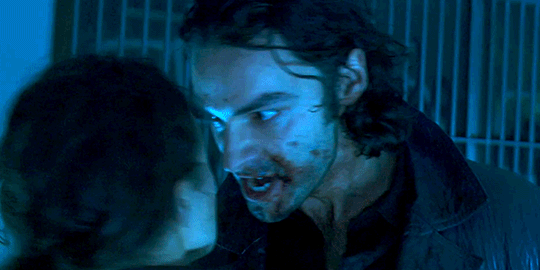


Even menacing af with somebody's blood on his face, I'd hit that. He can slaughter me afterwards, I'll die happy.
70 notes
·
View notes
Text
When you wake up in the middle of the night and can't go back to sleep because the idea of a new fic comes to you and your brain won't shut down!! Grrrrrr
3 notes
·
View notes
Note
Could I ask for tips on how to write kisses?
Writing The Perfect Kiss Scene
#1 Find the RIGHT moment
We all know what I mean! The "zing" when the character's faces are get close enough must come unexpected (but) when both of them are looking for romance/comfort.
For example:
Tripping over each other in the hallway
Person A covering their face with their hands and Person B prying them off, their eyes meeting...
Sitting next to each other in the library, elbows touching, and they happen to turn around to face each other...
Find a natural way to bring your characters the romantic atmosphere!
#2 Noticing the Other Person
It's natural to to see someone in a different way when there's romantic vibe pulsating in the air. Maybe your character notices that their crush has a speck of green in their eyes they didn't notice before.
#3 Build Ups
Describe how the characters feel moments before their lips touch. This includes things like racing hearts, sweaty palms, unsteady breathing. etc.
#4 Feeling all Self-Conscious
If you're writing a first-person POV or want to portray the nervous excitement of kissing a love interest for the first time, you can afford to have your character be distracted by how they feel inside, or worrying about how they smell/look, etc.
Maybe they feel like it's too early in the relationship to kiss
They're still thinking about that annoying math problem
Did I apply my new cherry-flavored chapstick? etc.
This should come in the same beat as the "notice the other person", heightening the romance tension between the characters.
Once they get closer and the kiss actually happens, these worries will melt away!
#4 Describing the Details
In most cases, it's best to keep things understated (especially in regards to tongues)
tongues cannot "tangle" or "battle" or "swish around"...please, no.
Focus on the lips and how the characters move (like hugging, pushing the other against a wall, breathing, etc.), adding the tongue as an afterthought.
Don't get too exicted about taste.
No, her tongue didn't taste like fresh roses and peaches, unless she was eating peach candy right before the kiss.
Focus on other sensations other than taste: especially touch, heat. the tickle of his breath on her cheekc, etc. Or even the smell of shampoo.
#5 The Pullaway + Reaction
Does the kiss end naturally, or does something else interrupt them?
How do the characters react: do they blush, say something, hug he other person, or run away with a deep blush? For couples, they can even tease the other.
If you like my blog, buy me a coffee☕ and find me on instagram! 📸
2K notes
·
View notes
Text
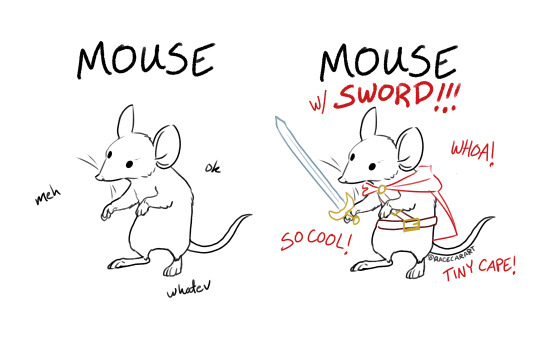
I've noticed that I really enjoy this aesthetic.
32K notes
·
View notes
Text
20 Essential Positive Traits to Make Your Characters Empathetic to Readers
Empathy: The character demonstrates an understanding of others' feelings and shows compassion.
Courage: The character faces fears or challenges bravely, inspiring admiration.
Determination: The character persists in achieving their goals despite obstacles, earning respect.
Kindness: The character is compassionate and considerate towards others, evoking warmth.
Humor: The character has a sense of humor, making them endearing and relatable.
Honesty: The character is truthful, creating trust and a sense of reliability.
Vulnerability: The character shows vulnerability, making them more human and relatable.
Curiosity: The character is curious and open-minded, inviting readers to explore with them.
Resilience: The character bounces back from setbacks, inspiring hope and admiration.
Generosity: The character is generous, creating a sense of goodwill.
Loyalty: The character is loyal to their values or to others, inspiring trust and admiration.
Optimism: The character maintains a positive outlook, even in difficult situations, inspiring hope.
Creativity: The character is imaginative and innovative, sparking curiosity and admiration.
Wisdom: The character demonstrates wisdom beyond their years, earning respect and admiration.
Integrity: The character acts according to a strong moral code, earning respect and trust.
Empowerment: The character empowers others, creating a sense of inspiration and admiration.
Altruism: The character acts selflessly for the greater good, inspiring admiration and empathy.
Resourcefulness: The character is resourceful in solving problems, earning respect and admiration.
Independence: The character is independent, inspiring admiration and respect.
Passion: The character is passionate about their goals, inspiring admiration and motivation.
1K notes
·
View notes
Photo

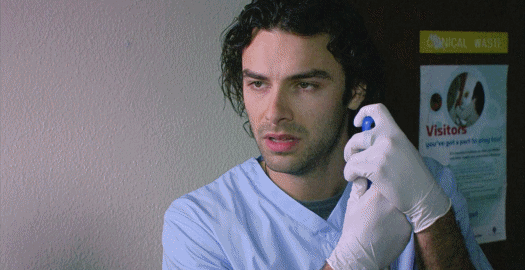






John Mitchell’s Cutest Moments (Being Human UK - S1 Ep 3 - Ghost Town)
200 notes
·
View notes
Note
how do you write a liar?
How to Write Liars Believably
Language
The motive of every goal is the make the lie seem plausible while taking blame off the speaker, so liars will often project what they say to a third party: "Katie said that..."
Referring to third parties as "they" rather than he or she
In the case of a deliberate lie prepped beforehand, there will be an overuse of specific names (rather than pronouns) as the speaker tries to get the details right.
Overuse of non-committal words like "something may have happened"
Masking or obscuring facts like "to the best of my knowledge" and “it is extremely unlikely," etc.
Avoiding answers to specific, pressing questions
Voice
There's isn't a set tone/speed/style of speaking, but your character's speech patten will differ from his normal one.
People tend to speak faster when they're nervous and are not used to lying.
Body Language
Covering their mouth
Constantly touching their nose
fidgeting, squirming or breaking eye contact
turning away, blinking faster, or clutching a comfort object like a cushion as they speak
nostril flaring, rapid shallow breathing or slow deep breaths, lip biting, contracting, sitting on your hands, or drumming your fingers.
Highly-trained liars have mastered the art of compensation by freezing their bodies and looking at you straight in the eye.
Trained liars can also be experts in the art of looking relaxed. They sit back, put their feet up on the table and hands behind their head.
For deliberate lies, the character may even carefully control his body language, as though his is actually putting on a show
The Four Types of Liars
Deceitful: those who lie to others about facts
2. Delusional: those who lie to themselves about facts
3. Duplicitious: those who lie to others about their values
Lying about values can be even more corrosive to relationships than lying about facts.
4. Demoralized: those who lie to themselves about their values
Additional Notes
Genuine smiles or laughs are hard to fake
Exaggerations of words (that would normally not be emphasized) or exaggerated body language
Many savvy detectives ask suspects to tell the story in reverse or non-linear fashion to expose a lie. They often ask unexpected, or seemingly irrelevant questions to throw suspects off track.
2K notes
·
View notes
Note
how do you write a liar?
How to Write Liars Believably
Language
The motive of every goal is the make the lie seem plausible while taking blame off the speaker, so liars will often project what they say to a third party: "Katie said that..."
Referring to third parties as "they" rather than he or she
In the case of a deliberate lie prepped beforehand, there will be an overuse of specific names (rather than pronouns) as the speaker tries to get the details right.
Overuse of non-committal words like "something may have happened"
Masking or obscuring facts like "to the best of my knowledge" and “it is extremely unlikely," etc.
Avoiding answers to specific, pressing questions
Voice
There's isn't a set tone/speed/style of speaking, but your character's speech patten will differ from his normal one.
People tend to speak faster when they're nervous and are not used to lying.
Body Language
Covering their mouth
Constantly touching their nose
fidgeting, squirming or breaking eye contact
turning away, blinking faster, or clutching a comfort object like a cushion as they speak
nostril flaring, rapid shallow breathing or slow deep breaths, lip biting, contracting, sitting on your hands, or drumming your fingers.
Highly-trained liars have mastered the art of compensation by freezing their bodies and looking at you straight in the eye.
Trained liars can also be experts in the art of looking relaxed. They sit back, put their feet up on the table and hands behind their head.
For deliberate lies, the character may even carefully control his body language, as though his is actually putting on a show
The Four Types of Liars
Deceitful: those who lie to others about facts
2. Delusional: those who lie to themselves about facts
3. Duplicitious: those who lie to others about their values
Lying about values can be even more corrosive to relationships than lying about facts.
4. Demoralized: those who lie to themselves about their values
Additional Notes
Genuine smiles or laughs are hard to fake
Exaggerations of words (that would normally not be emphasized) or exaggerated body language
Many savvy detectives ask suspects to tell the story in reverse or non-linear fashion to expose a lie. They often ask unexpected, or seemingly irrelevant questions to throw suspects off track.
2K notes
·
View notes
Text
20 Emotional Wounds in Fiction That Make Readers Root for the Character
Abandonment: Characters who have been abandoned by loved ones or caregivers can evoke sympathy from readers.
Betrayal: Being betrayed by someone close can create deep emotional wounds that make readers empathize with the character.
Loss of a Loved One: Whether through death or separation, the loss of a loved one can be a powerful emotional wound.
Rejection: Characters who experience rejection, whether in relationships or by society, can be relatable and evoke empathy.
Abuse: Physical, emotional, or psychological abuse can create complex wounds that shape a character's personality and behavior.
Neglect: Characters who have been neglected, especially in childhood, can evoke sympathy from readers.
Failure: Experiencing a significant failure or loss can create emotional wounds that make characters more relatable.
Guilt: Characters who carry guilt for past actions or decisions can be compelling and evoke empathy from readers.
Shame: Feelings of shame can create internal conflict and make characters more relatable and sympathetic.
Injustice: Characters who have experienced injustice or unfair treatment can evoke strong emotions from readers.
Trauma: Characters who have experienced traumatic events, such as war or natural disasters, can be sympathetic and relatable.
Loneliness: Characters who feel lonely or isolated can evoke empathy from readers who have experienced similar feelings.
Fear: Characters who face their fears or struggle with phobias can be relatable and evoke empathy from readers.
Self-doubt: Characters who struggle with self-doubt or low self-esteem can be relatable and evoke sympathy.
Identity Crisis: Characters who are grappling with questions of identity or struggling to find their place in the world can be sympathetic.
Addiction: Characters who struggle with addiction can be complex and evoke empathy from readers.
Betrayal of Trust: Characters who have had their trust betrayed can be sympathetic and relatable.
Unrequited Love: Characters who experience unrequited love can be sympathetic and evoke empathy from readers.
Isolation: Characters who feel isolated or disconnected from others can be relatable and evoke sympathy.
Fear of Failure: Characters who struggle with a fear of failure can be relatable and evoke empathy from readers.
3K notes
·
View notes
Note
Could you give any advice for "descriptive" writing of any scene or action scenes or mapping out the scenery (Mountains, forests, streets etc) - i believe this is a struggle for Non-English speaking writers due to lack of vast vocabulary.
Common Scenery Description Tips
Vocabulary is clearly an important part of description, but it doesn’t have to be a limit. The most important thing about description in fiction is picking the right details to mention:
How does the details add to the mood of the story? A mountain ridge will be dark, gray and foggy if the overall mood is meant to be mysterious/brooding. In contrast, a mountain can be brilliantly snow-capped, lush green and “smiling down” upon the character if they’re out for a light stroll.
How are the contrasts/complementary aspects being brought out?
Are you using the five senses? You can even combine the senses, ie. blue ringing of the church bells
(If you have the POV character) what
Some other tips for setting description:
Use similes and metaphors. Creative figures of speech always get my attention as a reader.
Mention story-specific elements. For example, “The sky was the shade of Zoes’ eyes” or “the mountains looked like a group of trolls sleeping on one another”
Be concise. Today’s readers don’t want to read paragraphs and paragraphs about one landscape. Outline the larger elements in the scene, their location and general mood. Add some details, then move on.
If the same location appears multiple times, differentiate the description little by little as you write, instead of trying to lay out one scene in too much detail at once.
That said, here are some helpful words/phrases:
Forests/Mountains
Color: bone-white, phantom-white, hazy gray
Sound: rumbling, booming grumbling, bellowing clapping, trundling, growling, thundering
Shape: crinkled, crumpled, knotted, grizzled, rumpled, wrinkled, craggy, jagged, gnarled, rugose
Action: sky-punching/stabbing/piercing/spearing, heaven-touching/kissing, snow-cloaked/hooded/wreathed/festooned
Sloping sides, sharp/rounded ridges, high point/peak/summit
Majestic, gargantuan humbling, vast, massive, titanic, towering, monumental, mighty, vast, humbling
Mountains having faces, etc.
Seas
Color: blue-green, crystal-clear crystalline, emerald, frothy, hazy, glistening, pristine, turquoise
Size: boundless, abyssal, fathomless, unconquerable, vast, wondrous
Sound: billowing, blustering, bombastic
Action: boisterous, agitated, angry, biting, breaking, brazen. Churning, bubbling, changing, brooding, calm, convulsing, enticing erratic, fierce, tempestuous, turbulent, undulating
Alluring, blissful, betwitching, breezy, captivating, chaotic, chilly, elemental, disorienting
Deserts
Sight: A landscape of sand, flat, harsh sunlight, cacti, tumbleweeds, dust devils, cracked land, crumbing rock, sandstone, canyons, wind-worn rock formations, tracks, dead grasses, vibrant desert blooms (after rainfall), flash flooding, dry creek
Sounds: Wind (whistling, howling, piping, tearing, weaving, winding, gusting), birds cawing, flapping, squawking, the fluttering shift of feasting birds, screeching eagles, the sound of one’s own steps, heavy silence, baying wild dogs
Smell: Arid air, dust, one’s own sweat and body odor, dry baked earth, carrion
Touch: Torrid heat, sweat, cutting wind, cracked lips, freezing cold (night) hard packed ground, rocks, gritty sand, shivering, swiping away dirt and sweat, pain from split lips and dehydration, numbness in legs, heat/pain from sun stroke, clothes…
Taste: Grit, dust, dry mouth & tongue, warm flat canteen water, copper taste in mouth, bitter taste of insects for eating, stringy wild game (hares, rats) the tough saltiness of hardtack, biscuits or jerky, an insatiable thirst or hunger
Streets
Dusty, fume-filled, foul, sumptuous, broad, bucolic, decayed, mournful, seemingly endless, empty, unpaved, lifeless, dreadfully genteel, muddy, nondescript, residential/retail
Bleach, flimsy, silent, narrow, crooked, furrowed, smoggy, commonplace, tumbledown, treeless, shady
The blacktop streets absorb the spring sunshine as if intent upon sending heaven's warmth back through my soles.
The streets absorbed the emotions in the air, the city as the steady and reassuring mother.
The streets were a marriage of sounds, from bicycle wheels to chattering.
In the refreshing light of early daytime, the streets had the hues of artistic dreamtime, soft yet bold pastels.
Cobbled streets flowed as happy rivers in sunlight.
Parties
Some extra tips for locations like parties, where lots of action is going around practically everywhere:
Focus on the important characters - where they are, who they’re with.
Provide some overall description of the structure of the party scene (a pool, a two-storey house with yard?), then move on to details.
Don’t try to describe everything.
whirlwind of laughter and music, a symphony of joyous chaos.
It was a gathering that shimmered with the glow of twinkling lights and echoed with the rhythm of dancing feet.
The air was alive with excitement, buzzing with conversations and the clink of glasses.
Every corner held a story waiting to unfold, a moment waiting to be captured in memory.
It was a tapestry of colors, a mosaic of faces, each adding their own brushstroke to the vibrant canvas of the night.
Laughter cascaded like a waterfall, infectious and unstoppable, filling the room with warmth.
The night was a carnival of senses, with aromas of delicious food mingling with the melodies that filled the air.
Time seemed to slip away in the whirl of the party, moments blending into each other like colors on a palette.
The energy of the crowd was electric, pulsing through the room like a heartbeat, binding everyone in a shared moment of celebration.
It was a celebration of life, where worries faded into the background, and the present moment was all that mattered.
996 notes
·
View notes
Text
If a scene feels flat and you can't figure it out, ask yourself:
• What can MC smell? Is there an ocean breeze, sweat, a cinnamon roll fresh out the oven?
• What can MC hear, besides the dialogue? Is a bird singing, river flowing, a car speeding, clock ticking?
• Can they taste something, even if they're not eating? Previously drunk alcohol or juice, aftertaste of a cigarette, smog, too instense perfume?
• Can they feel something on their skin? Rough clothes or delicate material, blowing wind, an allergy or a rash, grass that theyre laying on?
• What does the character see, besides other characters? Is the room dark or is sunlight coming in nicely? Are the colours vibrant or dull? Are there any plants?
• What's the weather? Is it snowing and the cold is making goosebumps appear on their arms? Is it hot and sweaty and clothes are clinging to their body?
• HOW DOES IT MAKE THEM FEEL? To any of the above.
Do they like the smell of cinnamon rolls or are they weirdos (I'm a weirdo, I don't fit in).
Does the clock ticking calm them down or annoy them?
Do they enjoy the aftertaste of a cig and like how dirty it makes them feel?
Are they sensitive to touch and how their clothing feels on their skin or are they indifferent?
Would they enjoy the scenery more if it was more sunny out, because they're afraid of the darkness?
Do they like it snowy or are they always cold and hate winter?
Come on, give them persoanlity, likes and dislikes, don't be scared to make them people and not only likeable characters.
4K notes
·
View notes
Note
whats up?? would you mind giving prompts for “movement”? take for example: “She walks over to the boy”. Instead of saying “She walks”, i would like something more creative?
Synonyms for "Walk"
stroll
saunter
amble
trudge
plod
march
stride
wander
ramble
advance
make one's way
traipse
prowl
skip
Synonyms for "run"
dart
sprint
rush
dash
hurry
scurry
scuttle
charge
gallop
bound
fly
scamper
sprint
race
jog
trot
I hope this helps! Let me know if I got what you wanted :)
2K notes
·
View notes
Text
Resources For Writing Sketchy Topics
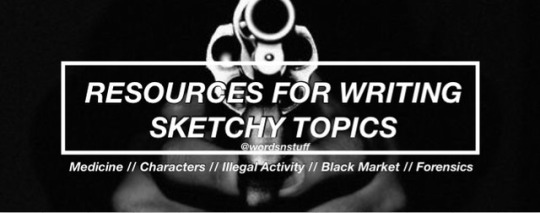
Medicine
A Study In Physical Injury
Comas
Medical Facts And Tips For Your Writing Needs
Broken Bones
Burns
Unconsciousness & Head Trauma
Blood Loss
Stab Wounds
Pain & Shock
All About Mechanical Injuries (Injuries Caused By Violence)
Writing Specific Characters
Portraying a kleptomaniac.
Playing a character with cancer.
How to portray a power driven character.
Playing the manipulative character.
Portraying a character with borderline personality disorder.
Playing a character with Orthorexia Nervosa.
Writing a character who lost someone important.
Playing the bullies.
Portraying the drug dealer.
Playing a rebellious character.
How to portray a sociopath.
How to write characters with PTSD.
Playing characters with memory loss.
Playing a pyromaniac.
How to write a mute character.
How to write a character with an OCD.
How to play a stoner.
Playing a character with an eating disorder.
Portraying a character who is anti-social.
Portraying a character who is depressed.
How to portray someone with dyslexia.
How to portray a character with bipolar disorder.
Portraying a character with severe depression.
How to play a serial killer.
Writing insane characters.
Playing a character under the influence of marijuana.
Tips on writing a drug addict.
How to write a character with HPD.
Writing a character with Nymphomania.
Writing a character with schizophrenia.
Writing a character with Dissociative Identity Disorder.
Writing a character with depression.
Writing a character who suffers from night terrors.
Writing a character with paranoid personality disorder.
How to play a victim of rape.
How to play a mentally ill/insane character.
Writing a character who self-harms.
Writing a character who is high on amphetamines.
How to play the stalker.
How to portray a character high on cocaine.
Playing a character with ADHD.
How to play a sexual assault victim.
Writing a compulsive gambler.
Playing a character who is faking a disorder.
Playing a prisoner.
Portraying an emotionally detached character.
How to play a character with social anxiety.
Portraying a character who is high.
Portraying characters who have secrets.
Portraying a recovering alcoholic.
Portraying a sex addict.
How to play someone creepy.
Portraying sexually/emotionally abused characters.
Playing a character under the influence of drugs.
Playing a character who struggles with Bulimia.
Illegal Activity
Examining Mob Mentality
How Street Gangs Work
Domestic Abuse
Torture
Assault
Murder
Terrorism
Internet Fraud
Cyberwarfare
Computer Viruses
Corporate Crime
Political Corruption
Drug Trafficking
Human Trafficking
Sex Trafficking
Illegal Immigration
Contemporary Slavery
Black Market Prices & Profits
AK-47 prices on the black market
Bribes
Computer Hackers and Online Fraud
Contract Killing
Exotic Animals
Fake Diplomas
Fake ID Cards, Passports and Other Identity Documents
Human Smuggling Fees
Human Traffickers Prices
Kidney and Organ Trafficking Prices
Prostitution Prices
Cocaine Prices
Ecstasy Pills Prices
Heroin Prices
Marijuana Prices
Meth Prices
Earnings From Illegal Jobs
Countries In Order Of Largest To Smallest Risk
Forensics
arson
Asphyxia
Blood Analysis
Book Review
Cause & Manner of Death
Chemistry/Physics
Computers/Cell Phones/Electronics
Cool & Odd-Mostly Odd
Corpse Identification
Corpse Location
Crime and Science Radio
crime lab
Crime Scene
Cults and Religions
DNA
Document Examination
Fingerprints/Patterned Evidence
Firearms Analysis
Forensic Anthropology
Forensic Art
Forensic Dentistry
Forensic History
Forensic Psychiatry
General Forensics
Guest Blogger
High Tech Forensics
Interesting Cases
Interesting Places
Interviews
Medical History
Medical Issues
Misc
Multiple Murderers
On This Day
Poisons & Drugs
Police Procedure
Q&A
serial killers
Space Program
Stupid Criminals
Theft
Time of Death
Toxicology
Trauma
290K notes
·
View notes
Text
Random Prompts 13:
"I hate you." "Aw, that's sweet. You can't even lie to my face."
"Why would you ever do this?" "Why? Why not?"
"Are you really that pissed off? It's just a little love bite." "I have stitches."
"Can we circle back to you two killing each other with blades later? We're under attack!"
"What just happened? Doesn't matter, it doesn't change us." "Oh, sure, my tongue in your mouth does nothing for our relationship, got it." "Keep talking and you won't have that tongue."
"If you ever hurt me, you're gonna regret it." "Maybe I should hurt you, just to test your bluff."
"Fuck me." "Agreed, this shit sucks-" "Fuck. Me."
"I shouldn't be worried. Why the hell am I worried?" "Because you like them?" "Like hell I do."
"Did you two..." "Kiss? Depends on what you call a kiss. Personally, being body-slammed into a wall then violently made out with isn't a kiss."
"Get the fuck out, right now!" "What? You invited me!"
782 notes
·
View notes




